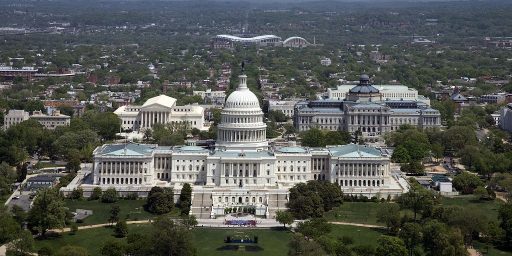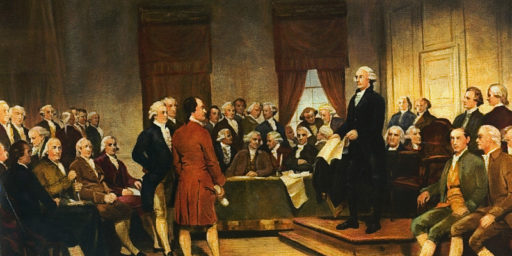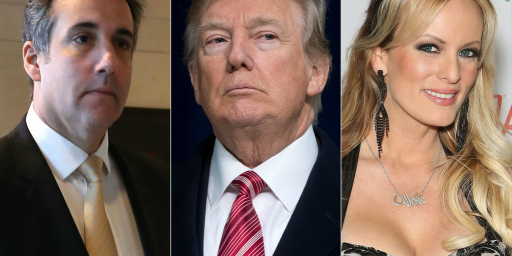Senate Strengthens Disclosure Rules
WaPo fronts a Jeff Birnbaum report that the Senate Ethics Committee rejected an independent office of public integrity to oversee congressional ethics compliance.
A Senate committee yesterday rejected a bipartisan proposal to establish an independent office to oversee the enforcement of congressional ethics and lobbying laws, signaling a reluctance in Congress to beef up the enforcement of its rules on lobbying. The Senate Committee on Homeland Security and Governmental Affairs voted 11 to 5 to defeat a proposal by its chairman, Sen. Susan Collins (R-Maine), and its ranking Democrat, Sen. Joseph I. Lieberman (Conn.), that would have created an office of public integrity to toughen enforcement and combat the loss of reputation Congress has suffered after the guilty plea in January of former lobbyist Jack Abramoff. Democrats joined Republicans in killing the measure.
The vote was described by government watchdog groups and several lawmakers as the latest example of Congress’s waning interest in stringent lobbying reform. After starting the year with bold talk about banning privately paid meals and travel, lawmakers are moving toward producing a bill that would ban few of their activities and would rely mostly on stepped-up disclosure and reporting requirements as their lobbying changes.
[…]
But Sen. George V. Voinovich (R-Ohio), chairman of the Senate’s Select Committee on Ethics and a member of Collins’s panel, said the ethics panel does not need any help because it is already doing a thorough job of enforcing the chamber’s rules. Speaking of the audits and investigations that the office of public integrity would undertake, Voinovich said: “The ethics committee is already doing those things.” With the backing of current and past ethics panel members in attendance, Voinovich proposed, and the governmental affairs committee adopted, an amendment that would strike the new office from the committee’s bill while requiring more openness in the now secretive ethics panel. An annual report would list the number of alleged rule violations that are reported or otherwise dealt with by the House and Senate ethics committees.
Watchdog groups reacted angrily. “The cutting out of the office of public integrity really undermines this whole effort,” said Joan Claybrook, president of the liberal group Public Citizen. Lieberman said he will try to get the integrity office approved next week when lobbying legislation is scheduled for action on the Senate floor. He said that he will be joined by other senators in a variety of efforts to get the lobbying bill back in the direction it was headed at the beginning of the year.
[…]
Some of the disclosure proposals are significant. The governmental affairs committee agreed for the first time to require professional grass-roots lobbying firms to report publicly how much they spend to influence government actions. Currently, only people who are paid to directly lobby lawmakers and their staffs must disclose their activities. Grass-roots lobbying is indirect lobbying to try to galvanize voters back home.
The bill would also require lobbyists to file quarterly reports, rather than the current biannual ones, on their activities, as well as a new, annual disclosure that would detail their donations to federal candidates, officeholders and political parties. In addition, lobbyists would have to disclose all the travel they arrange for lawmakers and all the gifts worth more than $20 that they give to them. Lobbying reports would be filed electronically and would be accessible via the Internet, something that is not always true today.
On Tuesday, the rules committee approved its own set of extra disclosures. Its bill would require that meals accepted by senators and their aides be reported online within 15 days. That bill would also require that senators get approval in advance from the Senate Select Committee on Ethics for any privately financed travel that they accept. The trips and their main details would have to be disclosed rapidly, including the names of the people who come along on private aircraft.
So far, only one outright ban has been approved. The rules committee decided to prohibit lawmakers from accepting gifts other than meals from registered lobbyists and foreign agents. That would include such benefits as tickets to sporting events and the theater. House Republican leaders have not endorsed a similar ban.
Another serious restriction, approved by the governmental affairs committee, would slow what has been called the revolving door between government and the K Street lobbying industry. The provision would double to two years the time during which former lawmakers and former top executive branch officials would be barred from lobbying their ex-colleagues. It would also ban — for a year after leaving their Capitol Hill jobs — former senior congressional staffers from lobbying anyone in the chamber in which they had worked. Currently, staff members are prohibited from lobbying only their former offices during their one-year “cooling-off period.”
Despite the tone taken by Birnbaum and the watchdog groups, the rules committee proposal is going in exactly the right direction. Congress has a constitutional mandate to regulate its own internal behavior, with the voters as the ultimate arbiter. Mandating full disclosure while closing loopholes that virtually invite the appearance of impropriety both cleans up the system and gives voters–and the media and opposition candidates–improved ability to keep an eye on their Members.





